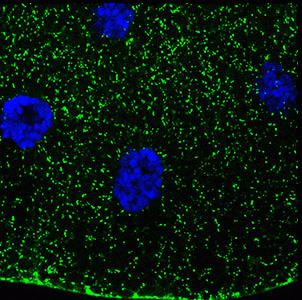Topics
Patient-inspired research links sugar metabolism to a rare genetic disorder

A team of scientists from many institutions, including the Jan and Dan Duncan Neurological Research Institute (NRI) at Texas Children's Hospital have recently published a paper in the journal PLoS Genetics that links alterations in sugar metabolism to Zellweger syndrome, a rare life-threatening genetic disorder.
The study was led by Drs. Michael Wangler and Hugo J. Bellen, principal investigators at the NRI and faculty at the Baylor College of Medicine. Dr. Wangler, a physician-scientist was inspired to embark on this research when he encountered a young patient with Zellweger syndrome, also known as Peroxisomal Biogenesis Disorder (PBD).
Zellweger syndrome/PBD results from defects in genes that synthesize peroxisomes, essential components of the cell that help to form and breakdown certain lipids. When peroxisomes do not form or are defective, people develop a wide range of conditions that include poor muscle tone, seizures, hearing and vision loss, poor feeding, skeletal abnormalities, as well as life-threatening problems in organs such as the liver, heart and kidney. There is no cure or treatment, other than palliative care.
Until this study, it was postulated that Zellweger syndrome/PBD was largely a result of improper brain development due to altered lipid metabolism.
The NRI team collaborated with Dr. James McNew, professor at Rice University, to employ metabolomics to comprehensively analyze the levels and profiles of various metabolites such as lipids, small carbohydrates, amino acids, and cholesterol in fruit flies that lacked two genes that are essential to make peroxisomes.
The researchers also found that these mutant flies exhibited most the symptoms such as short life span and locomotor defects, seen in PBD patients. Thorough analysis confirmed that these mutants are good animal models to further investigate PDB.
To their surprise, the team found that these mutants exhibited defects in sugar metabolism and were sensitive to reductions in dietary sugar. Unlike normal flies, these mutants could not tolerate a low-sugar diet, as they appeared to be starving.
The researchers found similar alterations in sugar metabolism in mice that lackedPEX genes, suggesting that peroxisomal function and glucose metabolism are strongly linked and conserved across species.
The Wangler lab is continuing to investigate how sugar metabolism is linked to PBD. Since peroxisome dysfunction is also implicated in other diseases such as Alzheimer's and cancer, they anticipate their studies into this rare disorder will help provide some beneficial insights for patients with other common diseases as well.





